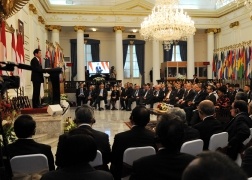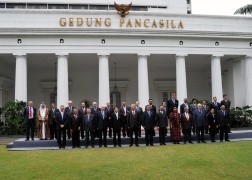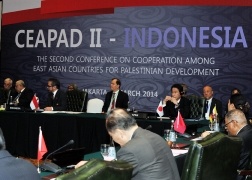Middle East
Second Conference on Cooperation among East Asian Countries for Palestinian Development (CEAPAD)



1. Meeting Outline
(1) Time and date: March 1 (Saturday) from 10 a.m. to 3 p.m.
(In parallel with the meeting, the Palestinian Business Forum was held under the sponsorship of the Indonesian government on March 1-2.)
(2) Venue: The Indonesian Ministry of Foreign Affairs and Borobudur Hotel (in Jakarta)
(3) Participants: Representatives of 22 countries and regions, and five international organizations (including 12 ministerial-level participants). South Africa took part as a guest.
Participating countries and organizations
Japan, Indonesia, Palestine, Brunei, Singapore, Vietnam, Thailand, South Korea, Malaysia, the Philippines, Laos, Cambodia, China, the Islamic Development Bank (IDB), the U.N. Relief and Works Agency for Palestine Refugees in the Near East (UNRWA) and the World Bank.
Observers
India, the United States, Norway, Egypt, Jordan, the United Arab Emirates, Qatar, Kuwait, Turkey, the League of Arab States, and the office of the Quartet Representative.
(4) Objective: CEAPAD is a consultative framework for Asian countries to consider effective assistance to the Palestinians by mobilizing their own knowledge and resources. In the second ministerial meeting, participants reviewed the assistance by respective countries in the areas of human resources development and private-sector development--designated as targets for assistance at the first ministerial meeting--as well as expressed or reaffirmed future assistance.
2. Outline of Discussions
(1) In an opening ceremony, Indonesian Foreign Minister Marty explained the country's Palestinian aid and praised the role of CEAPAD. Minister Kishida stressed the significance of CEAPAD and announced Japan's new assistance to the Palestinians. After remarks by Maite Nkoana-Mashabane, Minister of International Relations and Cooperation of the Republic of South Africa (a guest nation), Palestinian Prime Minister Hamdallah expressed his gratitude to CEAPAD and Asian countries for their assistance. Dr. H. Susilo Bambang Yudhoyono, President of Indonesia, declared the opening of the meeting, while underscoring the importance of Palestinian aid and expressing his thoughts on how stability should be restored to the Middle East.
(2) At the meeting, many representatives of the participating countries and organizations made the following remarks and expressed their intention to provide the Palestinians with assistance on the basis of their respective strengths:
- The role of Indonesia, the host country was highly praised. Japan's initiative of launching CEAPAD was highly appreciated.
- CEAPAD is playing a major role in achieving Middle East peace. Economic development in Palestine is essential to achieve peace through a "two-state solution." Human resources development and private-sector development are key factors in this regard.
- Knowledge and experience gained through economic development in Asia are useful for Palestinian development.
- (The United State, European and Arab participants made the following remarks:) CEAPAD should be highly evaluated as an epoch-making initiative to mobilize Asian strengths for Middle East peace.
(3) A luncheon hosted by Indonesian Foreign Minister Marty, and then a signing ceremony was held for the IDB, the Japan International Cooperation Agency (JICA) and Palestine on the establishment of an assistance cooperation mechanism called CEAPAD Facilitation Mechanism. It was followed by a joint press announcement by Japan, Indonesia, Palestine and South Africa, where a joint statement adopted at the meeting was distributed.
(4) In parallel with the ministerial meeting, the Palestinian Business Forum under the sponsorship of the Indonesian government and an exhibition of Palestinian products were held. At the forum, Dr. Jawad Naji, Minister of National Economy of the Palestinian Authority, briefed the audience on the Palestinian business environment and attended a question-and-answer session with business leaders from a number of countries.
3. Japanese Initiatives
Minister Kishida announced new assistance to the Palestinians as follows:
(1) Japan will provide about 200 million U.S. dollars assistance. In order to help promote the ongoing direct talks, an aid package of some 62 million US dollars, including about 30 million US dollars in financial assistance and infrastructure support of about 20 million US dollars, will be disbursed as early as this month.
(2) Japan will support the training of about 1,000 Palestinians over five years, including trilateral cooperation programs for the Palestinians involving CEAPAD participating countries. Specifically, Japan will work with Indonesia in agriculture, with Malaysia in finance, agriculture and planning, with Thailand in tourism, and with Singapore in disaster response and the environment (the Japan-Singapore Partnership Program for the 21st Century or JSPP21).
(3) CEAFAM, a mechanism that makes use of a fund to be established by the IDB will be launched, through cooperation with JICA, in order to promote support measures for human resources development taken by countries participating in CEAPAD.
(4) Japan will provide about 6.2 million US dollars in infrastructure aid and send experts to accelerate work to start production in the Jericho Agricultural Industrial Park (JAIP).
4. Significance and Evaluation
(1) Minister Kishida took part as co-chair in CEAPAD, a unique initiative of Japan aimed at achieving Middle East peace, and expressed Japan's determination to continue to play a leading role in promoting assistance for Palestinians by bringing together the strengths of Asian countries.
(2) Representatives of participating countries and organizations reaffirmed their intention to work closely together to push ahead with the CEAPAD process.
(3) Welcoming new members (China, the Philippines, Cambodia and Laos) CEAPAD produced a significant result in that it welcomed adopted a joint statement spelling out new assistance programs. The Palestinian aid through CEAPAD is expected to support the ongoing peace talks.




 (214KB)
(214KB)